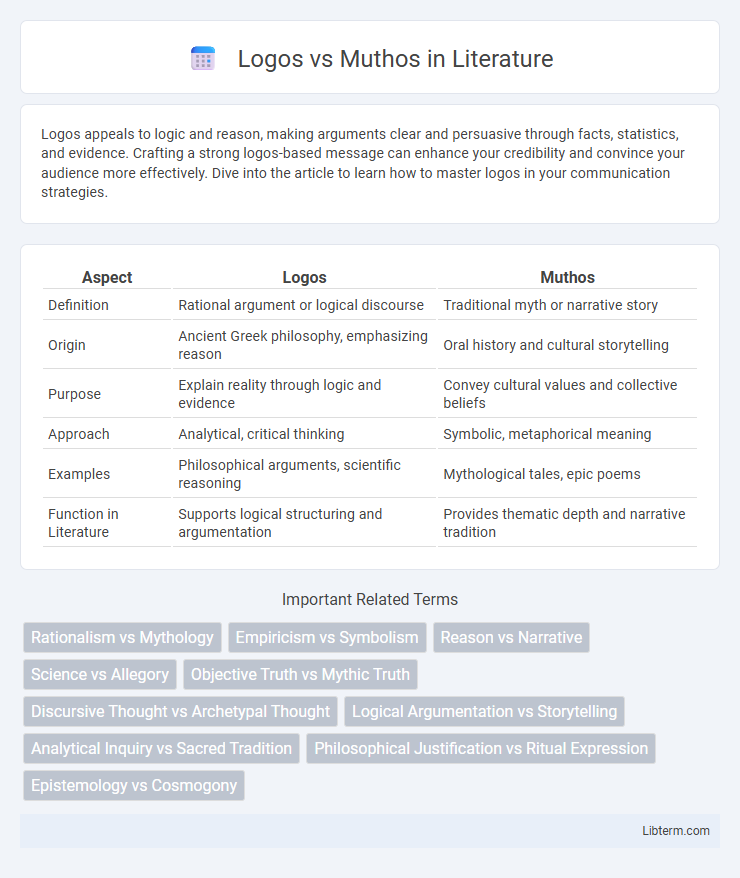Logos appeals to logic and reason, making arguments clear and persuasive through facts, statistics, and evidence. Crafting a strong logos-based message can enhance your credibility and convince your audience more effectively. Dive into the article to learn how to master logos in your communication strategies.
Table of Comparison
| Aspect | Logos | Muthos |
|---|---|---|
| Definition | Rational argument or logical discourse | Traditional myth or narrative story |
| Origin | Ancient Greek philosophy, emphasizing reason | Oral history and cultural storytelling |
| Purpose | Explain reality through logic and evidence | Convey cultural values and collective beliefs |
| Approach | Analytical, critical thinking | Symbolic, metaphorical meaning |
| Examples | Philosophical arguments, scientific reasoning | Mythological tales, epic poems |
| Function in Literature | Supports logical structuring and argumentation | Provides thematic depth and narrative tradition |
Defining Logos: The Rational Approach
Logos represents the rational approach rooted in logic, reason, and empirical evidence, serving as the foundation of scientific inquiry and philosophical analysis. It emphasizes critical thinking, structured argumentation, and objective truth-seeking, contrasting with Muthos, which relies on myth, narrative, and cultural symbolism. Key figures such as Aristotle and early Greek philosophers emphasized Logos as essential for understanding reality through systematic and verifiable methods.
Understanding Muthos: The Power of Story
Muthos embodies the intrinsic human need for storytelling, conveying meaning and values through narratives that transcend literal facts. Unlike Logos, which emphasizes logical reasoning and empirical evidence, Muthos harnesses metaphor, symbolism, and cultural memory to evoke emotional resonance and shared identity. Understanding Muthos reveals how ancient myths and modern stories alike shape cognition, inspire action, and preserve collective wisdom across generations.
Historical Origins of Logos and Muthos
Logos and Muthos originate from ancient Greek thought, with Logos referring to reason, logic, and structured discourse emphasized by philosophers like Heraclitus and later Aristotle. Muthos denotes traditional stories, myths, and narratives used by early Greeks to explain natural phenomena and cultural values before rational inquiry dominated. The historical contrast highlights a shift from mythological explanation toward analytical reasoning foundational to Western philosophy and science.
Logos in Ancient Philosophy
Logos in Ancient Philosophy represents rational discourse, logic, and the principle of order governing the cosmos, primarily emphasized by thinkers such as Heraclitus and Aristotle. It contrasts with Muthos by relying on reason and empirical observation instead of mythological explanations. The concept of Logos laid the foundation for Western scientific thought by promoting critical analysis and systematic inquiry into nature and human experience.
Muthos in Mythology and Tradition
Muthos, rooted in ancient mythology and tradition, represents the narrative framework through which societies convey cultural values, beliefs, and existential explanations. Unlike Logos, which emphasizes rationality and logical discourse, Muthos harnesses symbolic storytelling, mythic archetypes, and ritualistic elements to shape collective identity and moral understanding. This mythopoeic approach preserves ancestral wisdom and cosmological perspectives, reinforcing social cohesion and guiding human behavior within traditional communities.
The Intersection: How Logos and Muthos Coexist
Logos and Muthos coexist as complementary modes of understanding, where Logos represents rational, structured knowledge and Muthos embodies narrative and mythological meaning. Their intersection facilitates a holistic comprehension of human experience by integrating logical analysis with cultural storytelling. This synergy enriches philosophy, literature, and psychology, enabling deeper insights into truth and meaning.
Contrasts: Logic Versus Narrative Thinking
Logos emphasizes rationality, structured arguments, and objective analysis, prioritizing factual accuracy and critical thinking. Muthos centers on narrative thinking, using stories, myths, and symbolism to convey cultural values and human experience. The contrast lies in logos' focus on clarity and evidence, while muthos appeals to emotion and collective memory through imaginative storytelling.
Influence of Logos and Muthos on Western Thought
Logos, representing reason and logical discourse, has profoundly shaped Western thought by establishing the foundation for scientific inquiry, philosophy, and rational ethics. Muthos, embodying myth and narrative tradition, has influenced Western culture through storytelling, moral lessons, and the preservation of collective memory that informs identity and values. The interplay of Logos and Muthos continues to define the dual approaches to knowledge and meaning in Western intellectual history.
Modern Interpretations: Science and Myth
Modern interpretations highlight logos as the foundation of scientific reasoning, emphasizing logic, evidence, and empirical inquiry to understand reality. Muthos, representing myth, persists as a narrative tool shaping cultural values, moral frameworks, and existential meaning beyond rational analysis. The dynamic interplay between science and myth reflects humanity's dual need for objective knowledge and symbolic understanding in complexity.
Finding Balance: Integrating Logos and Muthos Today
Finding balance between Logos and Muthos involves blending rational analysis with mythic storytelling to enrich human understanding. Integrating empirical evidence from Logos with the emotional and cultural insights of Muthos fosters holistic decision-making and meaningful communication. Modern contexts benefit from this synergy by addressing complex issues through both logical rigor and narrative depth.
Logos Infographic

 libterm.com
libterm.com